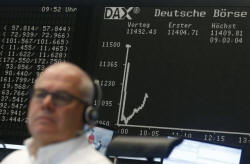|
World stocks build on record
highs as Irma weakens
 Send a link to a friend
Send a link to a friend
 [September 12, 2017]
By Kit Rees [September 12, 2017]
By Kit Rees
LONDON (Reuters) - World stocks climbed to
record highs on Tuesday as an easing in tensions over North Korea and
signs that Hurricane Irma was causing less damage than feared in the
United States boosted risk appetite.
The MSCI All Country World Index edged up 0.2 percent, building on
Monday's 0.9 percent gain -- its fourth-biggest so far this year.
The pan-European STOXX 600 index jumped to a one-month peak as insurers
made further headway and basic resources and financials joined in the
rally.
MSCI World's insurer index <.MIWO0ISGUS> gained 0.3 percent, as insured
property losses from Hurricane Irma's are expected to be smaller than
initially forecast.
"Whilst the damage is bad, it's not quite as bad as many people
expected," said James Butterfill, head of research and investment
strategy at ETF Securities. He said government spending in the aftermath
of natural disasters often boosts riskier assets such as stocks over the
long term.
U.S. President Donald Trump signed a bill on Friday that included $15.25
billion in hurricane-related aid.

Wall Street stocks futures rose, with the S&P 500 eyeing a fresh
all-time high after hitting a record closing level in the previous
session.
Oil prices were on the back foot, however, as refineries restarted in
the wake of Hurricane Harvey.
Britain's blue chip FTSE 100 index was a noticeable laggard, dropping
0.2 percent into negative territory as sterling surged more than
half a percent after British consumer price inflation hit its highest
level in five years.
The strong reading put the spotlight on the Bank of England's policy
decision on Thursday. The central bank has been struggling to keep
inflation at 2 percent since sterling tumbled in June 2016 in response
to Britain voting to leave the European Union.
[to top of second column] |

A trader sits in front of the DAX board at his desk at the Frankfurt
stock exchange, Germany, June 29, 2015. REUTERS/Ralph Orlowski

Another market focus on Tuesday will be the launch of Apple Inc's
next-generation iPhone -- whose sales will have repercussions beyond Apple for
many suppliers as well as its rivals.
GEOPOLITICS TAKES A BREATHER
Helping to drive the uptick in risk appetite was relief that North Korea did not
test-fire missiles or conduct nuclear weapon tests over the weekend as some had
feared.
The U.N. Security Council on Monday unanimously stepped up sanctions against
North Korea over its sixth and most powerful nuclear test, imposing a ban on its
textile exports and capping its imports of crude oil.
"The measures did not include an outright ban on oil supplies to the regime, so
the threat of an immediate military confrontation appears to have eased for
now," said Mutsumi Kagawa, chief global strategist at Rakuten Securities.
The risk-on mood dented appetite for traditional safe-haven assets such as U.S.
Treasury bonds and gold, which gave back most of their recent gains.
The yield on 10-year U.S. Treasuries jumped to 2.1515 percent from 2.1250
percent, while gold dropped to $1,326.31 per ounce, having hit a one-year peak
of $1,357.4 on Friday.
The sharp gains in U.S. bond yields supported the battered dollar, which held
steady against its currency basket, but eased slightly to $1.1959 against the
euro.
The dollar's resilience put pressure on copper prices, with the benchmark
contract down 1 percent as funds cut bets on higher prices. The metal has
rallied around 20 percent so far this year.
(Additional reporting by Hideyuki Sano in Tokyo; Editing by Kevin Liffey)
[© 2017 Thomson Reuters. All rights
reserved.] Copyright 2017 Reuters. All rights reserved. This material may not be published,
broadcast, rewritten or redistributed. |